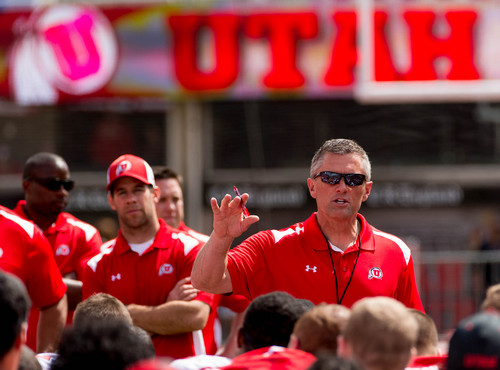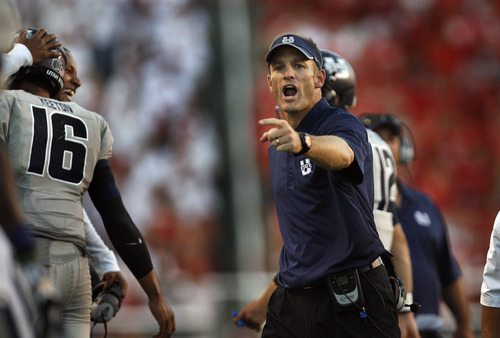This is an archived article that was published on sltrib.com in 2014, and information in the article may be outdated. It is provided only for personal research purposes and may not be reprinted.
Logan
Matt Wells' degree of disgust said everything about the growth of Utah State's football program.
The Aggie coach criticized his offense's performance in Saturday's practice, in comparison to USU's "elite standards."
Wow, when did this happen?
In its own way, Wells' rant showed how far the Aggies have come. They're respectable now, having moved way beyond any reasonable projections as of five years ago when former coach Gary Andersen took over the program. But what happens now? Can the Aggies remain relevant, amid the widening gulf between programs of their level and the Power 5 schools?
Yes, with asterisks. USU can compete favorably in the Mountain West, and providing a basis for judgment is among the reasons that conferences exist. That's why the Aggies' most important games in 2014 are against the likes of Colorado State and Boise State — not Tennessee and Wake Forest.
But those nonconference games will be fun, because the Aggies have proven in recent years that they could play with Oklahoma, Auburn, Wisconsin and USC. Those games were booked mainly as money-making enterprises, and they nearly turned into major breakthroughs.
Those opportunities will be lost if some Power 5 coaches have their way. They favor exclusive scheduling among those 65 schools, further separating themselves. That's not good for USU, BYU or college football in general.
Fans would benefit, no longer having to buy season tickets for some ridiculous matchups. The College Football Playoff Committee would have more evidence for choosing teams. But a lot would be lost if schools such as USU or independent BYU could never play Tennessee, Texas or Utah.
This movement is far from any proposal stage. It's merely a subject raised by ESPN, during the recent promotional visits of the 65 coaches to Bristol, Connecticut. But there's no doubt that college football is trending in the Power's 5 direction, and exclusive scheduling eventually could take hold.
ESPN's survey showed 30 coaches in favor, 23 opposed and 12 undecided. Andersen, now at Wisconsin, and Ohio State's Urban Meyer, formerly of Utah, were among the coaches who objected. Utah's Kyle Whittingham was undecided, while seven of his Pac-12 colleagues endorsed the idea.
Whittingham's neutrality is not surprising, because Utah is in an unusual position of having traditional rivals outside of the Power 5. So is Colorado, whose coach (Mike MacIntyre) also is undecided. Taking either side would have created a stir within their own states and fan bases.
But even beyond the in-state ramifications, preventing USU or BYU from playing Power 5 opponents would be unfair to those schools. I would support the Power 5's never playing Football Championship Subdivision opponents. Not much good can come of Utah's hosting Idaho State or Weber State's visiting Arizona State on Aug. 28, for example.
USU's trip to Tennessee and Wake Forest's coming to Logan this season create intriguing matchups, though. Andersen and Meyer recognize the value of those experiences for the players. As long as there's a reasonable chance to compete, those stages provide opportunities that players at USU's level deserve.
"The parity in college football is a whole lot closer than some people think," Wells said.
Wells believes the greatest effect of having Tennessee as a season opener comes during the grind of the offseason, when thoughts of performing in front of 100,000-plus fans against a Southeastern Conference opponent provide motivation for his players.
Wells also suggested, without naming names, that some lower-tier members of the Power 5 would find it easier to compete against one another than against the top outsiders. Personally, I'd say schools such as Purdue, Kansas and Kentucky, whose coaches favor exclusivity, should be frightened by the possibility.
Suddenly, those 5-7 records that keep bowl eligibility within range in November will turn into 3-9 marks. If the Power 5 are playing each other, the math says that only half the teams will win those games. That's a lot of losses for the other schools — and a defeat for the players who miss out on those experiences.
Twitter: @tribkurt





